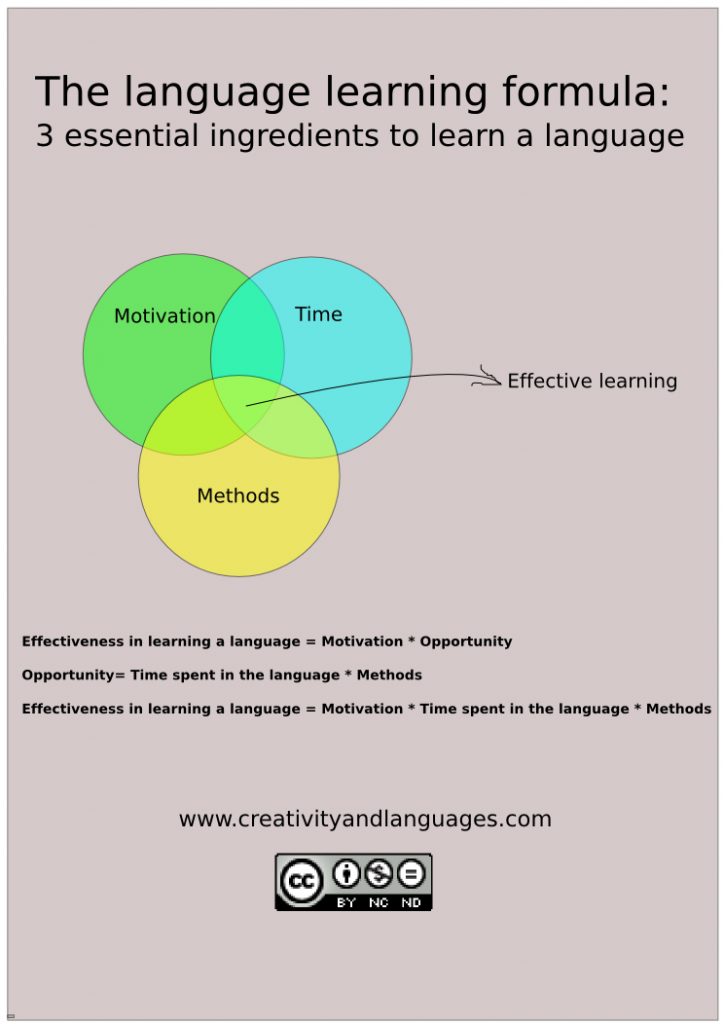The Language Learning Formula
Are you ready to discover the secret to unlocking your language learning potential?
Learning a new language is hard. Heck learning anything can be a real challenge.
But what if there was a trick? What if there was a secret formula you could use to make learning a new language a walk in the park?
The good news is that there is. And this formula is the most effective way to learn a new language.
The bad news? It still requires effort, motivation and discipline on your part.
Before I share with you your new weapon of mass language learning, I want you to ponder these 3 questions:
Why do you want to learn a new language?
How much time are you realistically willing to dedicate to it? This includes time outside of any formal training.
What things do you enjoy doing that you could use to help you learn a new language?
The answers to these questions are the key to unlocking your language learning super-powers.
Why?
Because within those 3 questions lie the 3 essential ingredients to effective language learning – motivation, time and methods.

Infographic on language learning by creativityandlanguages.com is licensed under a Creative Commons Attribution-NonCommercial-NoDerivs 3.0 Unported License.
Based on a work at creativityandlanguages.com.
And these 3 essential ingredients will turn your language learning cake into the fluffiest, most enjoyable language learning experience you have ever had.
And the best bit?
You are the key.
Motivations
Why are motivations so important when learning a language? Because motivations drive all our actions. It is why we do or don’t do something.
Identifying your motivations will lead you to effective language learning.
Motivations can be broken down into 2 main categories: Intrinsic (comes from within us) and extrinsic (comes from outside).
An example of an intrinsic desire to learn a new language is because you want to feel more confident at work.
Extrinsic desire would be because your boss has told you that without better English you can’t get that promotion.
From these 2 main categories, 7 subcategories of motivation exist.
Reward-Based or Incentive Motivation
This occurs when you know you will be getting a reward or incentive once a certain goal is achieved. For example, the pay rise you will get with the promotion. The bigger the reward, the better the motivation.
Fear-Based Motivation
This motivation occurs when you fear failure or disappointment because others are relying on you succeeding in the goal you have set. We can again relate this to the promotion example. You tell your significant other that you will get this promotion and with the money you will go on holiday. If you then don’t improve your English and get that promotion, you will disappoint your loved one. This fear can be enough to keep us motivated through even the most challenging tasks!
Achievement-Based Motivation
This type of motivation is as intrinsic as it comes. Those of you who have this as their motivation will be unstoppable. This type of motivation works for people who want to progress just for the sense of achievement and pride they get after achieving something.
Power-Based Motivation
This will occur if you are learning a language to exert control over or to create change in your life or the lives of others. As its name suggests, this is a powerful motivational force.
Affiliation Motivation
This applies to those who thrive in the presence of those in higher positions than them. This can be a social position or a work position. The idea behind it is that the influence of these people in your life will help you to achieve the success you crave.
Competence Motivation
Competence motivation is directly applicable to learning a new language, as this type of motivation is all about improving skills, talents and hobbies. Learning a new language falls into all 3 of these categories.
Attitude Motivation
This is all about a desire to change an aspect of your belief system and the way you see the world. Learning a new language can expose us to different cultural practices and beliefs. By learning more about the world, our views on certain issues and the way we interpret events can be changed for good.
[Source: Lifehack.org]
The main point, is that for you to engage in effective language learning, you have to WANT to learn a new language. It must be your decision, or at least something you are not completely against!
It is important for you to identify your motivations for learning a new language before embarking on the journey. If you are a rewards-based person for example, you may want to consider setting yourself mini goals instead of sticking with one long-term goal.
Time
So how much time should you dedicate to learning a new language? The answer to that all depends on you, your goals and timeline.
English First estimate that to go from beginner level (A1) to fluent (C1) should take around 850 hours of study. That is a total of 35 days. So, if you learnt English 24/7 for just over a month, you could be fluent. Unfortunately, you would almost certainly die of exhaustion, malnourishment and potentially thirst.
A more realistic schedule and one you may be able to see yourself sticking to is 3-7 hours of study per week. That equates to approximately 283-121 days of learning for you to become fluent in English. English First also recommends adding 50% to that number if you currently only speak one language and it is significantly different to English. Factoring that in for some of you, you are looking at around a year to get fluent. Doesn’t sound too bad right?
The most important thing to remember is that whatever schedule you set yourself, set aside uninterrupted time and stick to in the long term.
Methods
Before we look at the most effective ways to learn a language, let’s first see what the science has to say on how learning a new language effects the brain.
Science looks to bilinguals, multilinguals and polyglots to answer this question.
According to Dan Roitman, studies conducted with bilinguals show that speaking 2 or more languages boosts concentration, focus, the ability to multitask and plan and process information.
Studies of the brain have even shown that bilinguals have denser grey matter i.e more brain cells.
Are you ready for a bigger, better, more efficient brain?
Then let’s look at some methods you can start using today to make that happen.
There is no better place to start that with those who already speak multiple languages.
And there is a name for people who speak, read and write in several languages to high or near level fluency – Polyglots.
There is a great TED Talk given by Lydia Machova – “The Secret to Learning a New Language”. When the TED talk was aired , Lydia was learning her eighth language. Eighth?! Yep. Eighth. And she says in the TED talk that she challenges herself to learn a new language every 2 years. “The Secret to Learning a New Language” is dated October 2018. She is now likely on her ninth!
Lydia discusses the methods that she, and others like her, used to learn languages.
From various conversations and interviews, Lydia realised that Polyglots have simply found a way of enjoying the learning process through methods and activities that are fun, creative and social. For example, Lydia discusses when she learnt German. She chose to watch the hit American TV show, “Friends”. She loved it in her own language so thought it was a perfect way to learn a new one.
At first, she didn’t understand anything, but she continued to watch because she was enjoying watching one of her favourite shows. After a couple of weeks, she began to understand words. Eventually it was entire phrases. After a couple of months, she was understanding and laughing at the jokes.
Another Polyglot she spoke to, loved speaking to people. Anytime he wanted to learn a new language he would buy a phrase book and learn a handful of phrases. He would then head out to chat to people. He would make a million mistakes to begin with, but with feedback and practice eventually those mistakes got less and less.
After speaking to Polyglots around the world, Lydia concluded that there was no one method that worked for everyone. All of these people had found their own methods to effectively learn a new language. But they had one thing in common. Enjoyment played a large part in their effectiveness.
TED translators discussed their strategies when learning a new language, and 7 key principles emerged.
Set yourself realistic targets. If you are working full time, have a family and study then don’t set yourself a goal of 20 hours of study per week. It won’t happen.
Find a language learning habit that you can follow religiously. Make it sweet, simple and painless, but make sure you do it daily.
Use every opportunity to include the new language in your everyday life. Find books to read, recipes, movies to watch or chat to the neighbour. Every opportunity taken is a good opportunity when it comes to language learning!
Use technology. Change the language settings on your phone. Download an app. Get an online language tutor. These can be good ways to integrate the new language into your life.
Find a fun way to use and practice the new language. Label everything in your house. Listen to music. Play board games. Watch movies or TV shows. Whatever it is, make sure it’s fun!
Get to know people who speak your target language. There are plenty of online opportunities to connect with other language learners and native speakers. There may even be people in your local area or a language exchange you could attend.
Do not worry about making mistakes. They are an essential part of the learning process! If you don’t make mistakes, how will you ever improve?
So how does all of this provide you with the secret to learning a new language?
Firstly, learn a language because you want to. Or learn a new language because it will help you achieve a goal. Even learn a new language to make your fiancée’s family happy. But make sure you have a clear motivation when embarking on your language learning journey.
Secondly, set yourself realistic targets and goals that fit into your current schedule. Don’t set yourself the target of learning a new language for 5 hours a day if you have other commitments.
Similarly, don’t set yourself the target of learning for 3 hours a day if you know that you can’t stick to it. But whatever schedule you decide on, make sure that you set aside uninterrupted time and that it is something you can stick to in the long term.
Thirdly, find an enjoyable way to learn a new language and be religiously consistent in your language learning efforts and practice.
Do these 3 things and you have found the secret formula to effective language learning.
And remember, learning a new language affects the brain in some amazing ways that won’t just help you achieve your language learning goals. But can also help you in other pursuits, activities and daily tasks.
Also, check out our Raising a multilingual child and The Best English Language Learning Tools articles.
